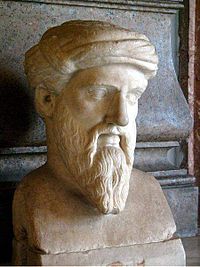Also known as:
Πυθαγόρας
More People of Greece
More Topic Categories
Related Destinations
Pythagoras (~-570 - ~-500)
 Pythagoras was an important Greek philosopher, mathematician, geometer, and music theorist. He was the founder of the Greek mathematical thought, created a spotless system of studying celestial bodies and also founded a mystic philosophical movement, Pythagorism.
Pythagoras was an important Greek philosopher, mathematician, geometer, and music theorist. He was the founder of the Greek mathematical thought, created a spotless system of studying celestial bodies and also founded a mystic philosophical movement, Pythagorism.As the details for his life were written long after his death, they are not trustworthy. He was born in Samos. He received excellent education and learned to be modest and logical. When he spoke, everyone was awed by his thinking and he did everything in a serene way. When he was eighteen years old, Samos was under the danger of falling under the dictatorship of Polycrates; thus, Pythagoras decided to leave for Miletos, where he was close to the physicist Anaxemandros and the philosopher Thales. Near Thales, Pythagoras learned a lot about mathematics, geometry and numbers in general. It was Thales that convinced him to go to Egypt, so he could learn more from the priests of Memphis and Diospolis.
His first stop in Egypt was Helopolis and later Memphis and Diospolis. The priests decided to test his endurance, thinking he would not be able to pass the harsh Egyptian liturgical examination. However, Pythagoras not only passed with flying colors but he was also allowed to participate in various sacrifices to the Gods, which was not allowed to any foreigner. There, he studied geometry and astronomy even more and perfected his education in arithmetic and music. According to Iamblichus, Pythagoras stayed in Egypt for 22 years, before moving to Babylon, prisoner of Kamvysis’ soldiers. In Babylon, he learned much more by the Persian priests and was taught theology and astronomy for twelve more years. Finally, he returned to Samos when he was 56 years old.
Back in Greece, he created a semicircular teaching room, which was preserved for many centuries later, named Pythagoras’ Semicircle. Soon, many philosophers from all over Greece went to Samos, asking to meet Pythagoras. Pythagoras, unable to keep up with these new duties and not having enough time to expand his philosophical thoughts, decided to leave Samos. Initially, he visited Delphi or Delos, before going to Crete to meet the priests of Morgos. Later, he reached the city of Crotone in Italy and, thanks to his grace and modest character, the lords of the city were awed. His reputation grew even more, and when he made his first public speech, everyone supported him. In fact, no one went back to their homelands, but instead built a huge building, the Omakoeion, and founded the so called Magna Graecia in Italy. Pythagoras died in Metapontio in Magna Graecia, withdrawn in the temple of the Muses. One of his most important contributions in geometry is the theorem that was named after him, the Pythagorean Theorem, according to which in every right triangle, the square of the hypotenuse is equal to the sum of the squares of the other two sides.
See Also:
 Athens Photos
Athens Photos
 Santorini Photos
Santorini Photos
 Crete Photos
Crete Photos
 Meteora Photos
Meteora Photos
 Corfu Photos
Corfu Photos


